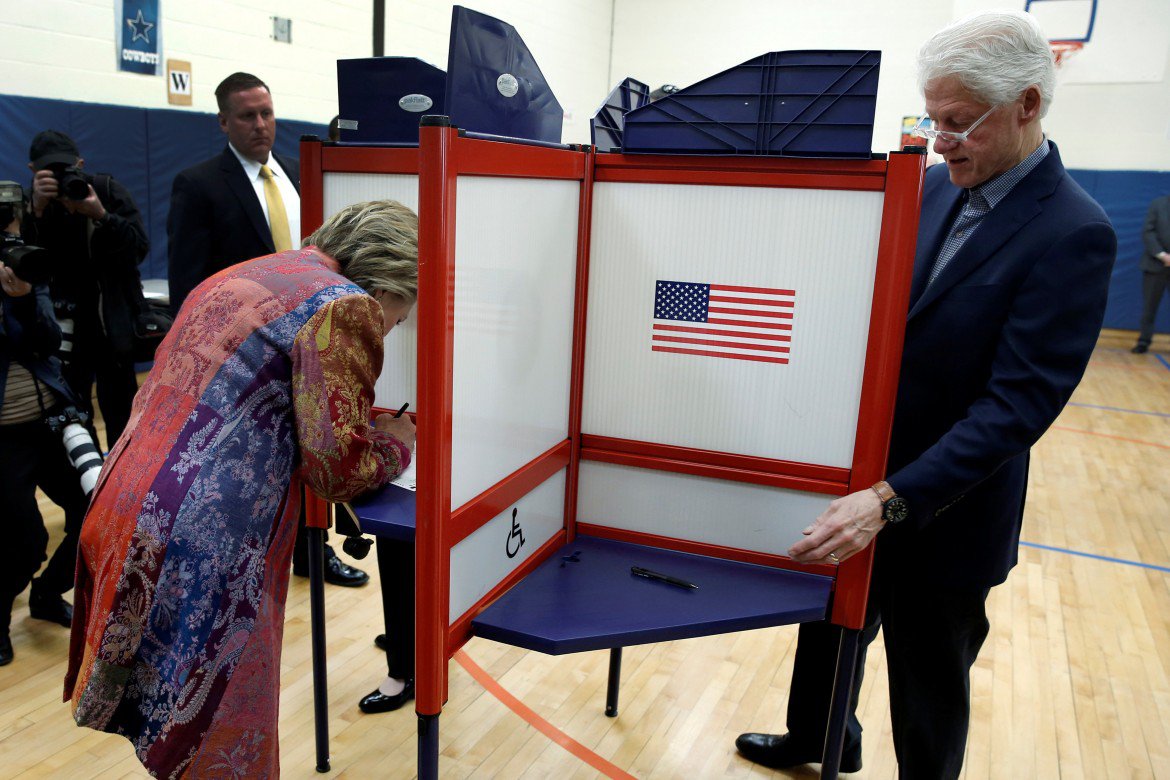U.S. elections
In New York, Trump and Clinton win the rubble of their parties
Two frontrunners emerged from the New York primary both victorious and at the helm of two deeply wounded parties.

The battle of New York is over. After two weeks of speeches, articles, murals and intensified negative campaigning, the winners were no surprise: Donald Trump and Hillary Clinton. But each victory left the victor with a similar problem: the Republican and Democratic parties have become furiously divided.
Some supporters of Sen. Bernie Sanders have declared that they would not vote for Clinton in the November general election (and vice versa), and supporters of Sen. Ted Cruz vowed not to vote for Trump (and vice versa). The frontrunners are coming from opposite situations — Trump, the Republican Party outsider, and Clinton, the Democratic Party itself — but the problem they must now solve is the same. How to unite voters split by a populist revolution?
Trump won Tuesday’s vote by 35 points over the centrist governor of Ohio, John Kasich, and 45 points ahead of Cruz, who, after minor victories in states like Colorado and Wyoming, aspired to position himself as a “reasonable alternative” to the exuberant billionaire. Instead, Cruz, the theo-conservative reactionary from Texas, left New York without a single delegate. Though Trump lost Manhattan itself, he celebrated with a speech in the city repeating his promises of grandeur before a cheering audience.
It was different for Sanders, who was set back by rules that bar independent voters, who aren’t registered Democrats, from casting a ballot. The parties — and individual states — have the right to establish their own election rules. In states that select their nominee by caucus, where electors can decide the same day to sign up for the Democratic ticket, Sanders has won repeatedly. In New York, however, the system excludes all those who joined the movement in recent weeks.
Clinton won 58 percent of the vote compared to Sanders’ 42 percent, a gap greater than the polls predicted. She dominated among women, among blacks and Hispanics, among older voters and in upstate cities: Rochester, Buffalo, Syracuse and all the boroughs of New York City, including Sanders’ home neighborhood of Brooklyn, where the Vermont senator attracted large crowds to rallies in recent weeks.
Clinton’s victory speech sought to rope in his supporters, insisting that the commonalities between the two candidates far outweigh the differences, and calling for a reunification of the party.
The former secretary of state is in position to clinch the nomination with the help of another crucial mechanism that helps ensure continuity in the party: superdelegates. Her advantage of 1,413-1,145 over Sanders’ in delegates earned at the ballot box is augmented by the 487 superdelegates who can vote for whomever they wish. These are essentially party cadres who have an interest in blocking an outsider. (In Congress, Sanders identifies as an independent, not a Democrat.)
To mount an effective challenge, Sanders needs to at least match Clinton’s delegates on July 1 voting. Without that, it will be very difficult for him to woo superdelegates to his side. It is probable that after Tuesday, the party will further close ranks behind Clinton.
By comparison, the Republican Party seems adrift, without an effective strategy to block the road to the leader that, paradoxically, no one seems to want. Trump could conceivably earn the 1,237 delegates needed to ensure the party’s nomination. If he doesn’t, the party will then have to decide whether to impose the letter of the rules and deny him the nomination or try to reach an agreement at the convention.
In this context, the remaining states — Pennsylvania, Maryland, Rhode Island, Connecticut and Delaware on April 26; Indiana in May; a handful of states in the West and finally New Jersey and California on June 7 — if not a formality are now only half of the race.
In both parties, but especially in the GOP, the campaign has already moved on the home front. Starting Wednesday, the Nation Republican Committee will meet in Florida to iron out the rules governing the convention in Cleveland in June. These typically inconsequential decisions now become crucial.
Not surprisingly, representatives of the candidates will be present to plead their cases, including Trump, who as recently as Monday complained that the party was trying to “steal the victory.”
Sanders, meanwhile, continued to summon support and to emphasize a clear generational demarcation in his party and in U.S. policy, which after Occupy and Black Lives Matter is trying to find a unified progressive voice.
But after Tuesday, the question might begin to center around what form this “political revolution” will take.
Originally published at http://ilmanifesto.info/clinton-e-trump-a-un-passo-dalle-nomination-la-battaglia-si-sposta-dentro-i-partiti/ on 2016-04-20
